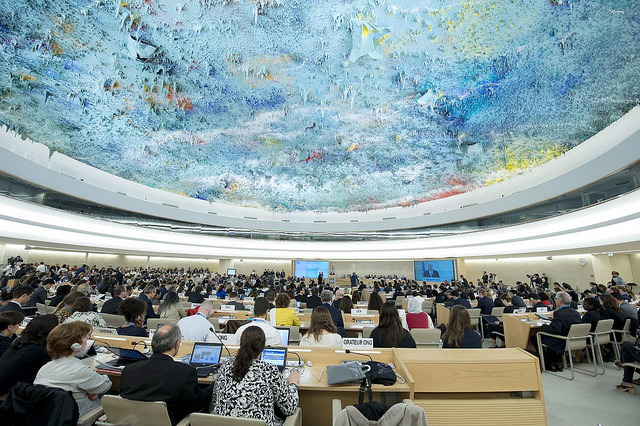Freedom of Speech
Blog
Internet Intermediaries, Human Rights, and Extremist Content
January 31, 2018Content removal on social media platforms often takes place through semi-automated or automated processes. Algorithms are widely used for content filtering and content removal processes1, including on social media platforms, directly impacting freedom of expression and raising rule of law concerns (e.g. questions of legality, legitimacy and proportionality). While large social media platforms like Google or Facebook have ...
Blog
What is Britain First? The Far-Right Group Retweeted by Donald Trump
December 6, 2017By Chris Allen Donald Trump’s decision to retweet a number of videos originally posted by Jayda Fransen – the deputy leader of the far-right street movement Britain First – was as unfounded as it was unexpected. Retweeted without additional comment, the three videos purported to show a group of Muslims pushing a boy off a ...
Blog
Vital Human Rights Evidence in Syria is Disappearing from YouTube
November 22, 2017By Dia Kayyali and Raja Althaibani So much of Syria’s history has been purposefully erased by ISIS in recent years. And now, we’re seeing another erasure of history– this time on YouTube. Thousands of videos showing human rights abuses in Syria, as well as the channels that feature these videos, are being removed by YouTube. ...
Blog
Industry Efforts to Censor Pro-Terrorism Online Content Pose Risks to Free Speech
October 11, 2017By Sophia Cope, Jillian C. York, and Jeremy Gillula In recent months, social media platforms—under pressure from a number of governments—have adopted new policies and practices to remove content that promotes terrorism. As the Guardian reported, these policies are typically carried out by low-paid contractors (or, in the case of YouTube, volunteers) and with little to ...
Blog
Telegram: The Mighty Application that ISIS Loves – Part I
June 7, 2017By Ahmet S. Yayla & Anne Speckhard ISIS has been the most successful terrorist organization in history using social media and the Internet for distributing its propaganda, dissemination of its news and more importantly to communicate. There is no doubt that the frequency and quality of ISIS posts on the Internet, including their videos, memes ...
Blog
Automated censorship is not the answer to extremism
May 24, 2017By Jim Killock In a report published last month by the Home Affairs Select Committee brands social media companies as behaving irresponsibly in failing to remove extremist material. It takes the view that the job of removing illegal extremist videos and postings is entirely the responsibility of the companies, and does not envisage a role for courts ...
Blog
The Law that Could Allow Trump to Shut Down the U.S. Internet
January 25, 2017By Sean Lawson In a pair of recent essays, Timothy Edgar, the academic director of law and policy at Brown University‘s Executive Master in Cybersecurity program, has outlined the legal basis for how a President Donald Trump could potentially shut down the U.S. internet in response to a national security crisis. Edger’s concerns stem from Trump’s statements on the campaign ...
News
Open, multi-stakeholder discussions necessary to tackle use of social media as a recruitment tool for radical groups
March 16, 2015Social media companies, law enforcement agencies and free speech activists all agree that open discussions among them are useful and necessary in dealing with the issue of social media being used as a recruitment tool by violent radical groups such as ISIS, VOX-Pol’s Dr. Maura Conway has said. Speaking to techPresident shortly after conclusion of ...
Blog
Two-Day Workshop on the Role of Social Media and Internet Companies in Responding to Violent Online Extremism
March 11, 2015by Anna Orosz The Center for Media, Data and Society at Central European University in Budapest, Hungary hosted the third VOX-Pol workshop on 5 – 6 March with the participation of nearly 40 experts from policy making, human rights groups, activists, law enforcement, social media companies, and academia. The diverse background and expertise of the participants enabled ...








